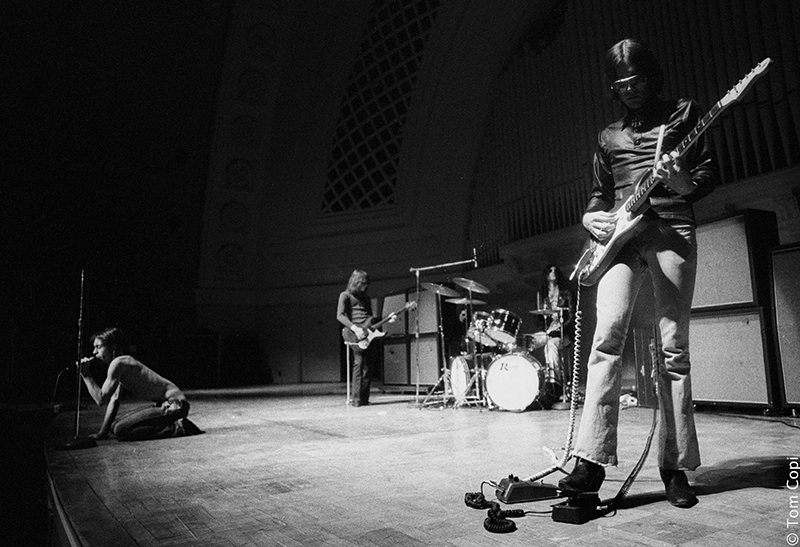Review: Gimme Danger

When Ann Arbor punk pioneers the Stooges played a tribute show for their deceased guitarist Ron Asheton at the Michigan Theater in 2011, arthouse director Jim Jarmusch was in the house. Having announced that he was beginning work on a documentary about the Stooges just the year before, one might have guessed that the Cuyahoga Falls-born director behind Night On Earth and Broken Flowers was planning to include the Ann Arbor show in his film.
But the amusing stories of Jarmusch's terse interactions with townies are the only real creative legacy the director left behind from his Ann Arbor visit. There's no footage from the Asheton tribute in Gimme Danger, Jarmusch's Stooges documentary, which will open in Detroit on Oct. 28. And in many ways, that's for the best.
Jarmusch was at the Asheton tribute, and presumably has been around for other moments in the lives of Iggy and Co. over the past decade-plus, as a friend and casual observer, not a documentarian. Jarmusch first worked with Iggy Pop, the Stooges' legendary and arrestingly bizarre frontman, on a standout scene from Jarmusch's 2003 narrative film Coffee and Cigarettes. In 2010 Pop personally requested that Jarmusch make a documentary about the band. The resulting film plays not like a staid rock biopic but like an intimate conversation between friends, a fun, loosey-goosey retelling of the tumultuous tale behind one of the most influential bands in rock.
Jarmusch begins the film in 1973 with one of the band's apparent endings. At the time, the Stooges had already released their three seminal albums The Stooges, Fun House, and Raw Power, but as a title card puts it, "They were dirt." Critically maligned and dragged down by Pop's drug abuse and increasingly unmanageable behavior, the band called it quits in 1974. From there, Jarmusch jumps back to the Stooges' childhoods, examining how they got to that low point and how they bounced back in 2003 to begin touring extensively in response to broad recognition from a host of younger artists. The stories, from the tale of Pop calling up Moe Howard to request his permission to use the name "The Stooges" to Pop's explanation of Soupy Sales' influence on his minimalistic lyrics, are outrageous and often hilarious.
Jarmusch's focus is relatively narrow. He interviews almost no one other than Iggy and the Stooges themselves (including Minutemen bassist Mike Watt, who toured with the band throughout the 2000s). The interview settings are almost laughably casual; Pop gives one of his interviews in a laundry room, and he idly plays with his bare feet as he talks. Guitarist James Williamson appears to have given his interview in a public bathroom, guitar in his lap.
The director doesn't attempt to editorialize or add much of his own flair to the material. Compensating for the lack of archival photos or footage of the band, he frequently makes amusing use of period-appropriate stock footage and even a couple of animated sequences to illustrate the Stooges' tales of their misadventures. But overall he seems to revel in the entertainment value of letting the Stooges tell their own stories. When you've got the gaunt, bug-eyed, slightly anxious Pop alongside the gaunt, hood-eyed, utterly deadpan drummer Scott Asheton (now deceased), what better method than to just wind these two characters up and let them go?
The relatively straightforward documentary may seem to fit oddly into the oeuvre of the director who made such visually striking and idiosyncratic films as Mystery Train and Only Lovers Left Alive, but in a way it also occupies its own very singular territory. The tale told here is unlikely to throw Stooges aficionados any new curveballs; Jarmusch himself has noted the difficulty he had finding any new footage of the band to include in the film. And the film's relative modesty (especially given its frequently outrageous subjects) seems unlikely to cause enough of a stir to attract many Stooges newbies to the theater. Like any of Jarmusch's other films, Gimme Danger is perfectly happy being exactly what it wants to be – a thoroughly fun, no-frills, firsthand account of the story behind one of rock's greatest bands – and nothing more.
Patrick Dunn is the interim managing editor of Concentrate and an Ann Arbor-based freelance writer whose work appears regularly in Pulp, the Detroit News, the Ann Arbor Observer, and other local publications. He ain't got time to make no apologies.
Gimme Danger premiered last night, October 25th, with a special screening at the Detroit Film Theater (DFT) featuring Iggy Pop and Jim Jarmusch. It opens officially Oct. 28 at the Detroit Film Theater, and will expand to a wider release on Nov. 4.


































